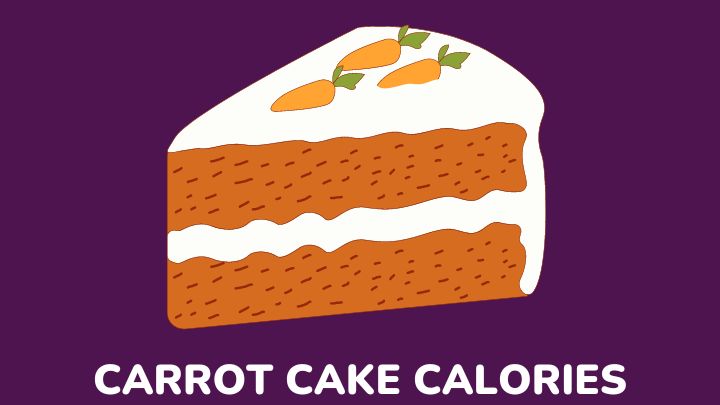Carrot cake is a popular dessert loved for its moist texture and cozy spices. People enjoy it at various gatherings, from birthdays to tea parties. But before indulging, it’s crucial to know about the number of calories in carrot cake and its nutritional value.
You might want to assume that carrot cake is 1000% healthy for you because it is made with vegetables (carrot). That does not suffice.
The recipe includes many other cake ingredients which can raise the calorie content and pose side effects, especially when eaten in excess.
In this article, you’ll discover how many calories are in carrot cake, what nutrients it offers as well as the healthy ways it can be used.
If you want to learn to enjoy carrot cake without guilt, read on to find out.
What is carrot cake?
Carrot cake, a timeless dessert, has a fascinating history that stretches back to medieval Europe.
Originally, carrots were used to sweeten cakes due to their natural sugars. Over time, carrots evolved into a prominent ingredient, leading to the creation of carrot cake.
Key ingredients in carrot cake include grated carrots, flour, sugar, eggs, oil or butter, and spices like cinnamon and nutmeg. These ingredients blend to form a moist and flavorful cake with a hint of spice and a vibrant orange hue.
Carrot cake is typically enjoyed as a dessert or snack, often paired with a creamy frosting made from cream cheese or buttercream.
Whether served at celebrations or enjoyed with a cup of coffee, carrot cake continues to be a cherished treat loved by many for its unique taste and wholesome ingredients.
How much calorie is in carrot cake?
Determining the calorie content of carrot cake is essential for making informed dietary choices.
Typically, a single slice of carrot cake contains approximately 300-400 calories. However, this can vary depending on serving size and specific recipes.
When comparing homemade to store-bought carrot cake, there are notable differences in calorie content.
Homemade versions often offer more control over ingredients, potentially resulting in lower calorie options. Conversely, store-bought varieties may include additional sugars and fats, leading to higher calorie counts per serving.
Understanding these distinctions empowers individuals to manage their calorie intake effectively while still enjoying carrot cake as an occasional indulgence.
Factors affecting carrot cake calories
Ingredient variations
Adding ingredients like frosting, nuts, and raisins can significantly increase the calorie content of carrot cake. These extra toppings often contribute additional sugars, fats, and calories to the overall recipe.
Type and amount of sweeteners
Different sweeteners, such as granulated sugar, brown sugar, honey, or maple syrup, can vary in calorie content. Additionally, the quantity of sweeteners used in the recipe can impact the overall calorie count.
Type and amount of fat
The type of fat used (butter, oil, or shortening) and the quantity can affect the calorie content. Higher-fat options can increase the calorie density of the cake.
Portion sizes
Larger portions naturally contain more calories than smaller ones. Paying attention to serving sizes is essential for managing calorie intake.
What is the nutritional profile of carrot cake?
According to the US Department of Agriculture, a 100-gram serving of carrot cake contains:
- Calories: 415
- Total fat: 10 g
- Saturated fat: 1.5 g
- Cholesterol: 0 mg
- Sodium: 567 mg
- Potassium:169 mg
- Total carbohydrate: 79 g
There is also the presence of vitamins (vitamin C and B6) and other trace minerals in small quantities.
Health benefits of carrot cake
Despite being a delicious dessert with plenty of calories, carrot cake surprisingly offers several health benefits thanks to its main ingredient, carrots. Here are some of these benefits:
Rich in vitamin A
Carrots are packed with beta-carotene, a precursor to vitamin A. This vitamin is essential for maintaining healthy vision, supporting immune function, and promoting skin health.
Source of antioxidants
Carrots contain antioxidants such as beta-carotene, lutein, and zeaxanthin, which help protect cells from damage caused by harmful molecules called free radicals. Antioxidants may also reduce the risk of chronic diseases like heart disease and cancer.
Promotes eye health
Beta-carotene found abundantly in carrots, is known for its role in maintaining good vision and preventing age-related macular degeneration and cataracts.
Supports digestive health
Carrots are rich in dietary fiber, which aids in digestion and promotes regular bowel movements. Fiber also helps maintain a healthy gut microbiome, reducing the risk of digestive disorders.
Boosts immune function
The vitamins and minerals found in carrots, such as vitamin C and potassium, contribute to a healthy immune system. A strong immune system helps the body fight off infections and illnesses.
May aid in weight management
Carrots are low in calories and high in fiber, making them a filling and satisfying snack option. Incorporating carrots into desserts like carrot cake can help satisfy sweet cravings without compromising on nutrition.
Provides nutrient diversity
Carrot cake often contains other nutritious ingredients like nuts, raisins, and spices. These additions contribute additional vitamins, minerals, and antioxidants to the dessert, further enhancing its nutritional value.
While carrot cake may not be a healthy food in the traditional sense, it can still be enjoyed as part of a balanced diet, especially when made with wholesome ingredients and consumed in moderation.
Risks and considerations
Carrot cake, while delicious, can be high in sugar and fat, particularly if it’s store-bought or topped with rich frosting.
Overconsumption of sugary and fatty foods may contribute to weight gain and increase the risk of chronic conditions like obesity and diabetes.
It’s essential to be mindful of portion sizes and frequency of consumption, especially for individuals with dietary restrictions or health goals.
Healthy alternatives to carrot cake
When craving a sweet treat like carrot cake, there are plenty of healthier alternatives to consider. Here are some delicious options:
Carrot muffins

Swap out the cake for muffins made with whole wheat flour, grated carrots, and a touch of honey or maple syrup for sweetness. These muffins are lower in sugar and fat compared to traditional carrot cake.
Carrot oatmeal bars
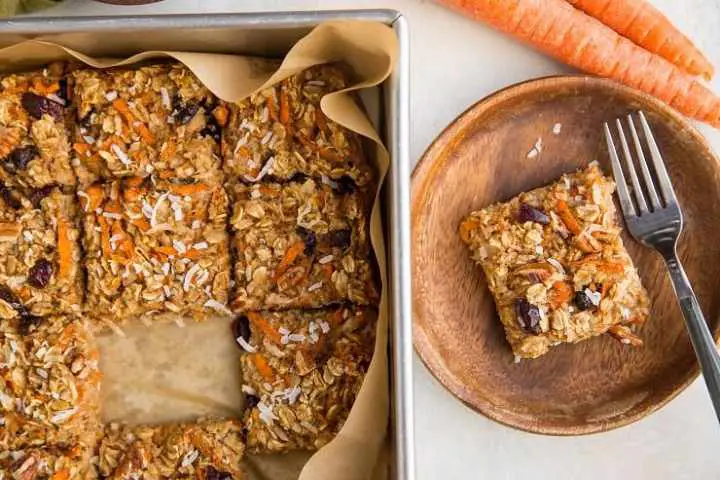
Combine rolled oats, grated carrots, nuts, and a drizzle of honey or peanut butter to create nutritious and satisfying bars. These bars are perfect for a grab-and-go snack or a quick breakfast option.
Carrot cake smoothie
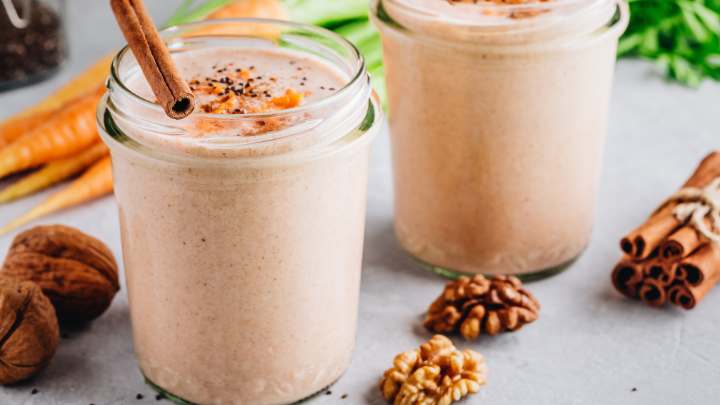
Blend carrots, banana, Greek yogurt, almond milk, and a sprinkle of cinnamon and nutmeg for a refreshing and nutrient-packed smoothie. It’s like enjoying carrot cake in liquid form but without the added sugars and fats.
Healthy carrot cake cookies

Bake cookies using shredded carrots, oats, nuts, and a small amount of coconut oil or applesauce for moisture. These cookies are a guilt-free way to satisfy your carrot cake cravings.
Carrot cake energy bites

Roll together shredded carrots, dates, nuts, and a dash of cinnamon to create bite-sized energy balls. They’re perfect for a quick energy boost or a post-workout snack.
Carrot cake overnight oats
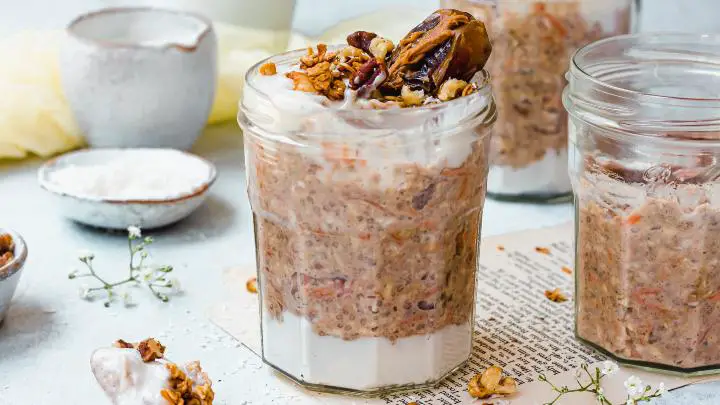
Mix rolled oats with grated carrots, almond milk, Greek yogurt, and a sprinkle of cinnamon and nutmeg. Let it sit overnight in the fridge, and in the morning, you’ll have a creamy and nutritious breakfast option reminiscent of carrot cake.
Carrot cake chia pudding
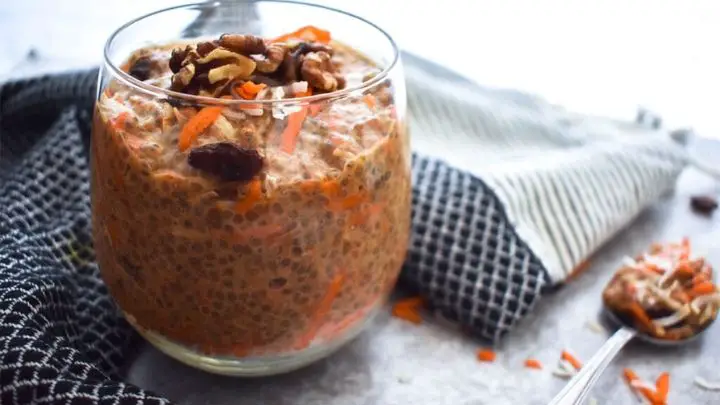
Combine chia seeds with grated carrots, almond milk, vanilla extract, and maple syrup. Let it sit in the fridge until the chia seeds have absorbed the liquid and formed a pudding-like consistency.
This indulgent yet healthy dessert is packed with fiber, omega-3 fatty acids, and antioxidants.
Healthy ways to eat carrot cake
Moderation is key
Enjoy carrot cake in moderation as an occasional treat rather than a daily indulgence. This helps maintain a balanced intake of calories and nutrients.
Pair with nutrient-rich foods
Enjoy a slice of carrot cake alongside a serving of fresh fruit or a side salad to add vitamins, minerals, and fiber to your meal.
Opt for healthier versions
Choose recipes or store-bought options that use healthier ingredients like whole wheat flour, reduced sugar, and lighter frosting options.
Portion control
Practice portion control by cutting smaller slices of carrot cake or sharing a slice with a friend to reduce calorie intake.
Balance with physical activity
Balance out indulgences like carrot cake by staying physically active and incorporating regular exercise into your routine.
FAQs
Is carrot cake healthy?
While carrot cake contains nutritious ingredients like carrots, it can also be high in sugar and fats. Enjoy it in moderation as part of a balanced diet.
Can you make a healthier version of carrot cake?
Yes, you can use healthier ingredients like whole wheat flour, reduce the amount of sugar, and opt for lighter frosting options to make a healthier carrot cake.
Healthier ingredients can reduce the number of calories in carrot cake and nourish you with more health benefits.
Can carrot cake be frozen?
Yes, carrot cake can be frozen for later consumption. Wrap it tightly in plastic wrap or aluminum foil and store it in an airtight container in the freezer for up to 3 months.
Conclusion
Carrot cake is a flavorful treat that can be enjoyed in moderation as part of a balanced diet. By understanding its calorie content and nutritional value, individuals can make informed choices about consumption.
Remembering to practice portion control, opt for healthier alternatives, and balance indulgence with nutrient-rich foods ensures that carrot cake can be a guilt-free pleasure.
With these strategies, you can relish the taste of carrot cake while prioritizing your overall health and wellness.
You can also learn about the calorie content in banana bread, the health benefits, and healthier alternatives you can have.
Thanks for reading.
